 W
WThe African barred owlet is a species of small owl in the family Strigidae found in much of southern, central and eastern Africa. The taxon may be four species rather than a single species.
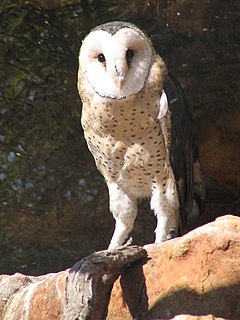 W
WThe African grass owl is a species of owl in the barn owl family, Tytonidae.
 W
WThe African wood owl or Woodford's owl, is a typical owl from the genus Strix in the family Strigidae which is widespread in sub-Saharan Africa.
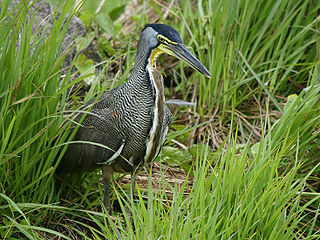 W
WThe bare-throated tiger heron is a wading bird of the heron family, Ardeidae, found from Mexico to northwestern Colombia, with one recorded sighting from the United States in Hidalgo County, Texas. It is 80 cm (31 in) in length and weighs 1,200 g (42 oz).
 W
WThe black-headed tanager is a species of bird in the family Thraupidae. It is found in the northern highlands of South America . Its natural habitats are subtropical or tropical moist montane forests, subtropical or tropical high-altitude shrubland, and heavily degraded former forest.
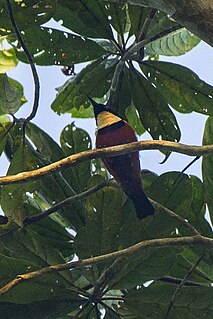 W
WThe buff-throated sunbird is a species of bird in the family Nectariniidae. It is found in Benin, Cameroon, Ivory Coast, Ghana, Guinea, Guinea-Bissau, Liberia, Nigeria, Sierra Leone, and Togo.
 W
WThe Burmese shrike is a species of bird in the family Laniidae. It is found in Bangladesh, Cambodia, China, India, Laos, Myanmar, Thailand, and Vietnam. Its natural habitats are subtropical or tropical moist lowland forest and subtropical or tropical moist montane forest.
 W
WThe Cape eagle-owl is a species of owl in the family Strigidae. It is one of several large species of the eagle-owl genus Bubo.
 W
WThe Carolina chickadee is a small passerine bird in the tit family Paridae. It is often placed in the genus Parus with most other tits, but mtDNA cytochrome b sequence data and morphology suggest that separating Poecile more adequately expresses these birds' relationships. The American Ornithologists' Union has been treating Poecile as distinct genus since 1998.
 W
WThe chestnut-eared aracari, or chestnut-eared araçari, is a bird native to central and south-eastern South America. It belongs to the toucan and aracari family (Ramphastidae). The chestnut-eared aracari is a larger, more colorful bird than the black-necked aracari, which it otherwise resembles.
 W
WThe crested kingfisher is a very large kingfisher that is native to parts of southern Asia, stretching eastwards from the Indian Subcontinent towards Japan. It forms a species complex with the other three Megaceryle species.
 W
WDarwin's rhea, also known as the lesser rhea, is a large flightless bird, but the smaller of the two extant species of rheas. It is found in the Altiplano and Patagonia in South America.
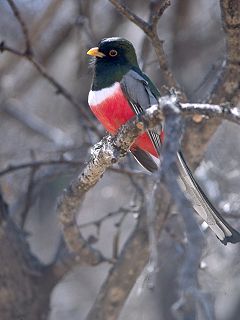 W
WThe elegant trogon is a near passerine bird in the trogon family. Along with the eared quetzal, it is the most poleward-occurring species of trogon in the world, ranging from Guatemala in the south as far north as the upper Gila River in Arizona and New Mexico. The most northerly populations of subspecies ambiguus are partially migratory, and the species is occasionally found as a vagrant in southeasternmost and western Texas.
 W
WForster's tern is a tern in the family Laridae. The genus name Sterna is derived from Old English "stearn", "tern", and forsteri commemorates the naturalist Johann Reinhold Forster.
 W
WFrances's sparrowhawk is a small bird of prey. The nominate subspecies, A. f. francesiae, is endemic to Madagascar, the other subspecies are found in the Comoro Islands.
 W
WThe greater yellownape is a species of bird in the woodpecker family Picidae.
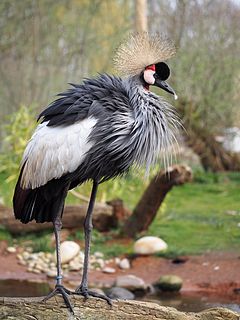 W
WThe grey crowned crane, also known as the African crowned crane, golden crested crane, golden-crowned crane, East African crane, East African crowned crane, Eastern crowned crane, South African crane, is a bird in the crane family, Gruidae. It is found in eastern and southern Africa, and is the national bird of Uganda.
 W
WThe grey-hooded sierra finch is a species of bird in the family Thraupidae.
 W
WThe Humboldt penguin is a South American penguin living mainly in the Pingüino de Humboldt National Reserve in the North of Chile, although its habitat comprises most of coastal Chile and Peru. Its nearest relatives are the African penguin, the Magellanic penguin and the Galápagos penguin. The Humboldt penguin and the cold water current it swims in both are named after the explorer Alexander von Humboldt. The species is listed as vulnerable by the IUCN with no population recovery plan in place. The current population is composed of 32,000 mature individuals and is going down. It is a migrant species.
 W
WThe Indian spotted eagle is a large South Asian bird of prey. Like all typical eagles, it belongs to the family Accipitridae. The typical eagles are often united with the buteos, sea eagles and other more heavyset Accipitridae, but more recently it appears as if they are less distinct from the more slender accipitrine hawks.
 W
WThe king rail is a waterbird, the largest North American rail.
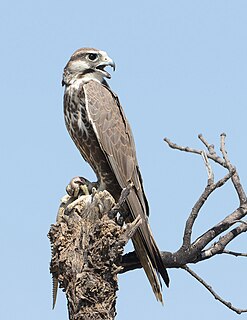 W
WThe laggar falcon, also known as the lugger falcon or jugger is a mid-sized bird of prey which occurs in the Indian subcontinent from extreme southeastern Iran, southeastern Afghanistan, Pakistan, through India, Nepal, Bhutan, Bangladesh and northwestern Myanmar.
 W
WThe Lesser Antillean tanager is a species of bird in the family Thraupidae. It is found in Grenada and Saint Vincent. Its natural habitats are subtropical or tropical moist lowland forests and heavily degraded former forest.
 W
WLincoln's sparrow is a small sparrow native to North America. It is a less common passerine bird that often stays hidden under thick ground cover, but can be distinguished by its sweet, wrenlike song. Lincoln's sparrow is one of three species in the genus Melospiza which also includes the song sparrow and the swamp sparrow. It lives in well-covered brushy habitats, often near water. This bird is poorly documented because of its secretive nature and breeding habits solely in boreal regions.
 W
WThe little cuckoo-dove is a species of bird in the family Columbidae. It is a reddish brown pigeon, and is found in Brunei, China, Indonesia, Laos, Malaysia, Myanmar, Thailand, and Vietnam. It is rated as a species of least concern on the International Union for Conservation of Nature Red List of Endangered Species.
 W
WThe Madagascar cuckoo-hawk, also known as the Madagascar baza or the Madagascan cuckoo falcon, is a species of bird of prey in the family Accipitridae. It is endemic to Madagascar.
 W
WThe Madagascan owl, also known as the Madagascar owl or Madagascar long-eared owl, is a medium-sized owl endemic to the island of Madagascar. It is sometimes considered to be conspecific with the long-eared owl.
 W
WThe Madagascan sparrowhawk is a species of bird of prey in the family Accipitridae.
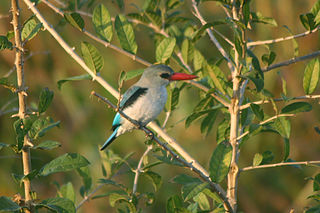 W
WThe mangrove kingfisher is a kingfisher in the genus Halcyon. It is similar in appearance to the woodland kingfisher. It is found along the eastern coastline of Sub-Saharan Africa, living in woodland, along rivers, and in estuaries and mangrove. The International Union for Conservation of Nature (IUCN) has assessed it as being of least concern.
 W
WThe many-banded aracari, or many-banded araçari, is a species of bird in the family Ramphastidae.
 W
WThe marsh owl is a medium to large species of owl in the family Strigidae.
 W
WThe mountain caracara is a species of bird of prey in the family Falconidae. It is found in puna and páramo in the Andes, ranging from southern Ecuador, through Peru and Bolivia, to northern Argentina and Chile. It is generally uncommon to fairly common. It resembles the closely related Carunculated Caracara and White-throated Caracara, but unlike those species, its chest is uniform black. Juveniles are far less distinctive than the red-faced pied adults, being overall brown with dull pinkish-grey facial skin.
 W
WThe Newfoundland red crossbill is a member of the crossbill genus which has its crossed bill adapted for prying open the tightly closed spruce or pine cones in order to extract the seeds found abundantly on the island of Newfoundland.
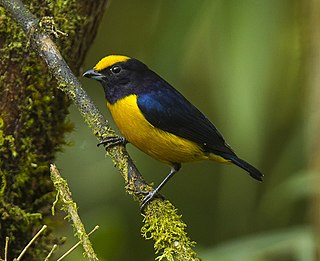 W
WThe orange-bellied euphonia is a species of bird in the finch family, Fringillidae. They were formerly considered tanagers (Thraupidae). It is found in Bolivia, Brazil, Colombia, Ecuador, Guyana, Panama, Peru, and Venezuela. Its natural habitats are subtropical or tropical moist lowland forest and subtropical or tropical moist montane forest.
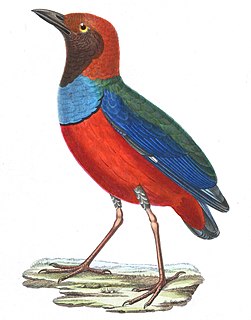 W
WThe Papuan pitta is a species of pitta. It was formerly considered a subspecies of the red-bellied pitta. It is found in the Aru Islands, New Guinea and the northern Cape York Peninsula. Its natural habitat is subtropical or tropical moist lowland forest. It is threatened by habitat loss.
 W
WThe pink-footed goose is a goose which breeds in eastern Greenland, Iceland and Svalbard. It is migratory, wintering in northwest Europe, especially Ireland, Great Britain, the Netherlands, and western Denmark. The name is often abbreviated in colloquial usage to "pinkfoot". Anser is the Latin for "goose", and brachyrhynchus comes from the ancient Greek brachus "short" and rhunchos "bill".
 W
WThe pitta-like ground roller is a species of bird in the ground roller family Brachypteraciidae. The species is monotypic, having no subspecies. It is endemic to Madagascar.
 W
WThe plain bush-hen is a species of bird in the family Rallidae. It is endemic to the Philippines.
 W
WThe red-flanked lorikeet is a species of parrot in the family Psittaculidae. It is found in Mollucas, New Guinea and the Bismarck Archipelago. Its natural habitats are subtropical or tropical moist lowland forests and subtropical or tropical mangrove forests. Only the adult males have the red plumage on the head and sides.
 W
WThe red-headed trogon is a species of bird in the family Trogonidae.
 W
WThe saker falcon is a large species of falcon. This species breeds from central Europe eastwards across the Palearctic to Manchuria. It is mainly migratory except in the southernmost parts of its range, wintering in Ethiopia, the Arabian peninsula, northern Pakistan and western China. The saker falcon is the national bird of Hungary, United Arab Emirates, and Mongolia.
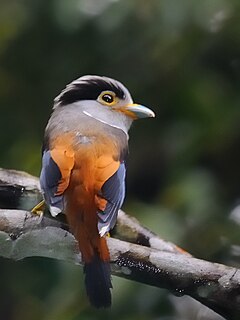 W
WThe silver-breasted broadbill is a species of bird in the broadbill family, Eurylaimidae. It is monotypic within the genus Serilophus. There are ten currently recognised subspecies, one of which, rubropygius, was formerly treated as a separate species.
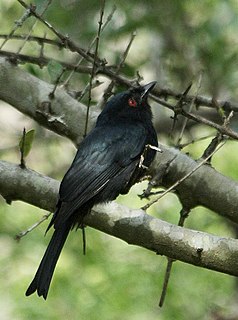 W
WThe common square-tailed drongo, formerly the square-tailed drongo, is a passerine bird in the family Dicruridae. It is a common resident breeder in parts of southern Africa.
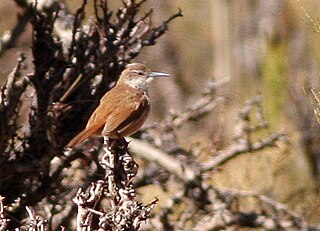 W
WThe straight-billed earthcreeper is a species of bird in the family Furnariidae. It is found in Argentina, Bolivia, Chile, and Peru. Its natural habitat is subtropical or tropical high-altitude shrubland.
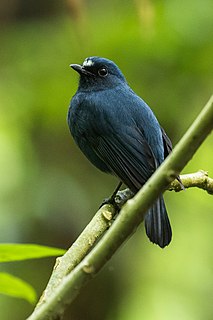 W
WThe Sunda robin is a species of bird in the family Muscicapidae. It is endemic to Indonesia, residing in the mountains of Sumatra and Java. Its natural habitat is subtropical or tropical moist montane forests.
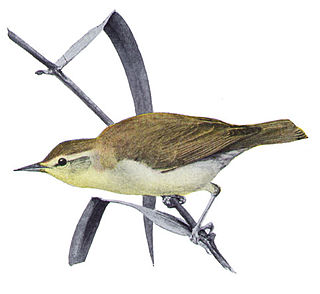 W
WSwainson's warbler is a small species of New World warbler. It is monotypic, the only member of the genus Limnothlypis. Swainson's warbler was named after William Swainson, an English ornithologist.
 W
WThe vulturine guineafowl is the largest extant species of guineafowl. Systematically, it is only distantly related to other guineafowl genera. Its closest living relative, the white breasted guineafowl, Agelastes meleagrides inhabit primary forests in Central Africa. It is a member of the bird family Numididae, and is the only member of the genus Acryllium. It is a resident breeder in northeast Africa, from southern Ethiopia through Kenya and just into northern Tanzania.
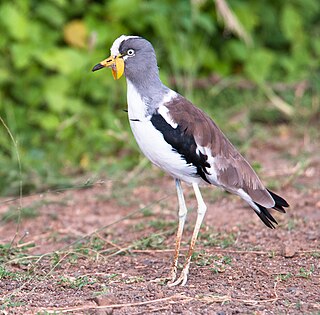 W
WThe white-crowned lapwing, white-headed lapwing, white-headed plover or white-crowned plover is a medium-sized wader. It is resident throughout tropical Africa, usually near large rivers.
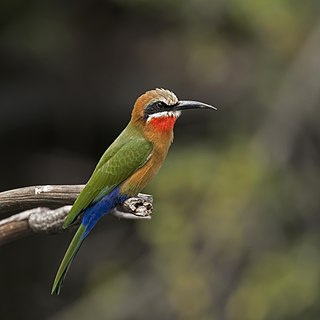 W
WThe white-fronted bee-eater is a species of bee-eater widely distributed in sub-equatorial Africa.
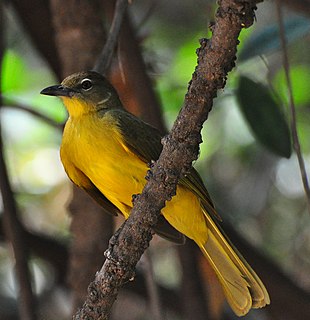 W
WThe yellow-bellied greenbul is a species of songbird in the bulbul family, Pycnonotidae. It is found in eastern, southern and west-central Africa. Its natural habitats are subtropical or tropical dry forests, subtropical or tropical moist lowland forests, and dry savanna.